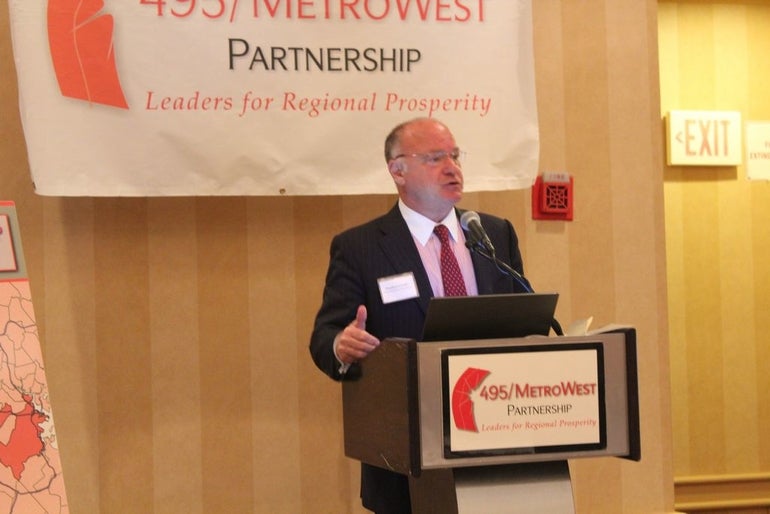Stephen Crosby, chairman of the Massachusetts Gaming Commission, said this morning in Westborough that he expects casino construction to begin within one year.
The commission is nearly finished conducting background checks on applicants competing for the state’s sole slot parlor license, he said, and is starting the process for the resort casino license applicants.
Crosby, who spoke at the 10th annual meeting of the 495/MetroWest Partnership, said the background checks are in depth and said he was uncomfortable with their scope at first, describing it as “offensive, intrusive and overdone.” But he said the state police who are handling the checks for the commission have convinced him the detailed checks are vital.
“We have to protect the integrity of the process,” Crosby said. “That has been our single highest priority.”
Approximately 300 people, called “qualifiers,” associated with the 11 casino and slots bidders, must disclose things like identifying scars and tattoos, how many cars their dependent children own, financial information and a number of other details, Crosby said.
The paperwork for those background checks, which cost applicants a total of $9.5 million, amounted to 29,000 pages of information, he said. He added that some qualifiers have already been deemed unsuitable by the commission and have stepped down from their respective applicant groups.
Crosby said it’s unlikely any of the 11 applicants will be wholly disqualified if some of their members are found to have criminal backgrounds. The commission would likely tell the applicant to get rid of the qualifier in question, he said.
Formal applications containing detailed site plans and other information are due to the commission in October for slots applicants and in December for resort casino applicants. The commission expects to award the licenses by late March or early April, Crosby said.
In the meantime, communities are negotiating host agreements with the casino and slots applicant. Neighboring communities to Milford met this week with representative from Foxwoods to discuss potential mitigation agreements for the area, Crosby said.
If a surrounding community and a casino developer can’t come to an agreement — which is required to submit an application to the state later this year – the state’s gambling law calls for a forced arbitration process overseen by the commission.
Crosby said the Massachusetts law is “the best gambling law that’s ever been passed in any jurisdiction in the United States by a mile.”
A community mitigation funds and a public health trust fund, each of which will contain up to $20 million, will address unforeseen impacts in surrounding communities and will work to address gambling addiction problems
Crosby said that amount of money is five to ten times greater than any other jurisdiction with gambling has allotted to those causes.
Crosby admitted that the commission doesn’t what impact casino gambling will have on the state lottery, which provides approximately $1 billion a year in local aid to city and town governments. Massachusetts residents have one of the highest per-capita gambling expenditures in the country at $725 per person annually, he said. The casinos would provide up to $500 million per year in revenue to the state.
“Personally, I wonder how much money there is to be gambled within a given state,” Crosby said. “That’s one of the conundrums we’re wrestling with.”
Read more

